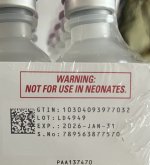I just received my order from PepPens.
Ordered last week when they were running the half off sale on pens.
My order was missing one of the 4 pens I had ordered and I sent an email to them that afternoon. They responded back apologizing for the mistake and said they would get the pen in the mail that same day. I received a tracking number yet that night for the new shipment.
I will be experimenting with the pens this weekend and if I like how they work I will definitely look at buying from them again. 👍
Ordered last week when they were running the half off sale on pens.
My order was missing one of the 4 pens I had ordered and I sent an email to them that afternoon. They responded back apologizing for the mistake and said they would get the pen in the mail that same day. I received a tracking number yet that night for the new shipment.
I will be experimenting with the pens this weekend and if I like how they work I will definitely look at buying from them again. 👍

